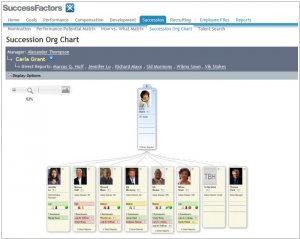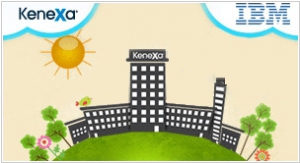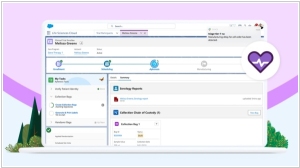Kenexa vs SuccessFactors
May 18, 2023 | Author: Adam Levine
4

IBM Kenexa delivers talent management solutions across the entire employee lifecycle that are backed by behavioral science insight and the unique combination of content, technology and services. Where other companies focus on just one piece, we bring them all together to create the best picture for each company’s success.
13

SAP SuccessFactors’ time-tested, analyst-recommended solutions drive goal execution across your business from top-to-bottom like no other alternative. By focusing on the three pillars of Business Execution excellence—Business Alignment, Team Execution and People Performance—SuccessFactors Business Execution Software delivers real business impact. It provides the foundation for organizational success by giving you the tools to put the right people in the right place to work on the right things.
Kenexa and SuccessFactors are both human resources management software solutions designed to support various HR functions within organizations. Kenexa, owned by IBM, provides a suite of HR tools and services, including recruitment, onboarding, performance management, learning management, and employee engagement. It offers features like applicant tracking, skills assessments, performance evaluations, and surveys to help organizations attract, develop, and retain talent.
SuccessFactors, on the other hand, is an HR management system developed by SAP. It offers modules for core HR, performance management, learning and development, compensation management, and succession planning. SuccessFactors focuses on strategic HR management, helping organizations align their workforce with business objectives and drive employee performance and engagement.
See also: Top 10 Enterprise Social Software
SuccessFactors, on the other hand, is an HR management system developed by SAP. It offers modules for core HR, performance management, learning and development, compensation management, and succession planning. SuccessFactors focuses on strategic HR management, helping organizations align their workforce with business objectives and drive employee performance and engagement.
See also: Top 10 Enterprise Social Software
Kenexa vs SuccessFactors in our news:
2014. IBM adds more business intelligence to its Kenexa talent management suite

IBM has recently unveiled three new cloud-based predictive HR services, all of which incorporate consultative engagements from Kenexa workforce scientists. The first service, IBM Kenexa Predictive Hiring, focuses on modeling critical roles such as sales associates in retail, brokers and advisors in finance, researchers in the pharmaceutical industry, and production line workers in manufacturing. The system then evaluates the required skills by generating assessments that are seamlessly integrated into the cloud-based recruitment platform. The second service, IBM Kenexa Workforce Readiness, assesses the existing skills within organizations and predicts the key job families necessary for a customer-centric approach in line with emerging market conditions. Lastly, IBM Kenexa Predictive Retention consists of three components. Firstly, it provides senior HR leaders with predictive insights into employees who are at risk of leaving. Additionally, IBM has introduced a new Talent and Change consulting practice, offering four consulting services tailored for companies undergoing transitions.
2012. IBM acquires social HCM Kenexa, outpaces Salesforce in the Social Enterprise race
Last week IBM acquired (for $ 1.3 billion) the SaaS talent management system Kenexa. After all, all software giants are now buying SaaS talent management systems (Salesforce acquired Rypple, SAP acquired SuccessFactors, Oracle acquired Taleo). Therefore, IBM management thought that it's a good decision. Moreover, Kenexa is not just a SaaS talent management system, it's the Social SaaS talent management system (it allows to use Twitter and Facebook for attracting talents and building relationships with them). And all Social is very appreciated in our days. Even despite of the fact that since 2007 Kenexa has posted losses totaling about $150 million. (It's very interesting, how it can be loss-making, having 8.900 customers, including Starbucks, Walmart, Verizon). ***
2011. SAP acquires SaaS-champion SuccessFactors

(SuccessFactors CEO Lars Dalgaard) ***
2011. Top 5 largest SaaS implementations. SuccessFactors vs WorkDay

It wasn't so easy to create a list of the largest SaaS projects. Because though SaaS vendors would like to promote themselves, they often have no clearance from customer to go public on their deployments. Sometimes, when a dispute on the largest projects starts, they claim that they have a customer with XXX users, but don't tell what customer and provide no proof. Therefore, our rating is based on unverified information. However, it is interesting that neither Salesforce nor Google Apps are included in it. And four out of five deployments - are talent management (or human capital - HRM) systems: ***
2010. Talent Management 2.0: SuccessFactors vs Taleo

Everyone knows that "talent is everything". Everyone knows that 80% of his time boss should devote to employees and their motivation. But in practice, boss remember about an employee only when he did something wrong and proved once again that his salary is too high. However, as competition in all areas is growing and business becomes more and more dependent of its talents, this outdated practice will only lead to deadpool. That's why talent management software and services are now experiencing a rapid growth. In the recent SaaS tool ratings talent management (and related technologies - HRM and e-Recruting) - are among most demanded. In this talent management market two gorillas have emerged: Taleo and SuccessFactors. And both these companies provide SaaS solutions. ***
2008. SuccessFactors plugs Google Apps into HCM
SuccessFactors, a SaaS vendor, has partnered with Google to bring its cloud-based collaboration suite into the human capital management (HCM) space. SuccessFactors has launched five Google integrations that can be activated within its talent management software, including integrations with Google Docs, Google Calendar, Google Talk, Google Maps, and Google Book Search. While the integration is not as deep as in the case of Salesforce, it has the potential to reach a large user base as SuccessFactors boasts over 4 million users. This move positions SuccessFactors as the first HCM application to link with Google Apps, which already has over 500,000 organizations signed up. SuccessFactors sees this integration as a differentiation from competitors, highlighting its multitenancy and shared services architecture. The company plans to explore further integrations with other providers and sees vast opportunities in leveraging web services in the cloud. The Google integrations offer various benefits, such as in-app chat support, synchronized performance tasks with Google Calendar, embedding Google documents in profiles, accessing relevant books through Google Book Search, and visualizing team locations with Google Maps. However, the integration with Gmail was excluded due to privacy concerns, and the Google Talk integration only allows chat conversations to be copied and pasted within SuccessFactors. Customers can enable the integrations through configuration options provided by SuccessFactors and must separately subscribe to Google Apps, with the option to restrict users to their corporate Google Apps accounts.



